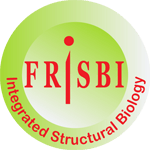FRISBI


NMR spectroscopy provides invaluable insights into the structural and dynamical features, involving interactions, of biomolecular systems. We are taking advantage of NMR, combined with other structural biology methods, to investigate molecular properties that are important to achieve a given biological function.
Three Bruker Avance spectrometers are installed in the lab: a 600 MHz with room temperature probes, a 800 MHz and a 700 MHz with cryo-probes to achieve highest sensitivity.
800 MHz spectrometer: For experiments that need extreme sensitivity and high resolution, a 800 MHz spectrometer equipped with a cryogenic probe (5 mm) is available (triple-resonance proton détection, carbon, nitrogen (and deutérium) CryProbeTM with Z gradients).
700 MHz spectrometer: For experiments that need high sensitivity and resolution, a 700 MHz spectrometer equipped with a cryogenic probe (5 mm) is available (triple-resonance proton détection, carbon, nitrogen (and deutérium) CryProbeTM with Z gradients).
600 MHz spectrometer: For experiments that need high resolution but not high sensitivity, the 600 MHz spectrometer with three room temperature probes is available :
- a triple-resonace TXITM 5 mm probe (proton détection, carbon, nitrogen (deutérium) with Z gradients ;
- a BBITM broadband probe (proton détection and heteronucleus from 109Ag to 31P and 15N) with Z gradients ;
- a selective 5mm 1H détection probe, allowing 19F détection (without 1H decoupling).
The 600 MHz and 700 MHz can be coupled to a high pressure device where sample pressure can be varied in the 0-2.5 kbar range for all probes.
See more at: